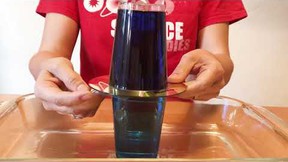Elementary School Science Projects (715 results)
|
Select a resource
Coding Projects
Sort by
|
Trees grow more during the early spring than they do the rest of the year. Because of this period of dormancy, or lack of growth, each year of growth is marked by a line called a tree ring. You can count the number of rings in the cross section of a tree trunk to show how old the tree is. You can also count the number of rings in a stem to see the age of a stem or branch. One way to measure the rate of growth of a tree is to count the number of rings per inch. Trees with high numbers of…
Read more
You've probably heard the phrase, "practice makes perfect" more times than you care to remember, but is it actually true when you use a music game as your practice for real-life singing, strumming, or drumming? You can design a science fair project to discover the answer! First, you'll need to think about how to measure how well someone is playing or singing a song in real life. Using the test you design, measure several musicians' ability to play or sing a few different songs. Then have your…
Read more
If you're interested in analyzing how things break, check out the Science Buddies project Fractography: The Way Things Break.
Read more
Have you ever noticed that hip-hop songs have a fast tempo, while country ballads are usually slow? Do you think there is a correlation between the number of beats per minute (bpm) in a song and the type of music? You can explore whether different genres of music have different bpm ranges by measuring the bpm in several different songs from a number of different genres. Bpm can be measured using free music software, like the one listed below in the Bibliography, or by counting all the beats you…
Read more
Does adhesive tape hang tight at different temperatures? Measure the adhesive strength of tape at both low and high temperatures. To raise the temperature, we suggest using a blow dryer at both low and high heat settings. To lower the temperature, use an ice pack (try to keep condensation from forming on the tape and confounding the results). For even lower temperatures you could try "dry ice" (frozen carbon dioxide), if available. (Wear heavy gloves when handling dry ice, because it can…
Read more
|




